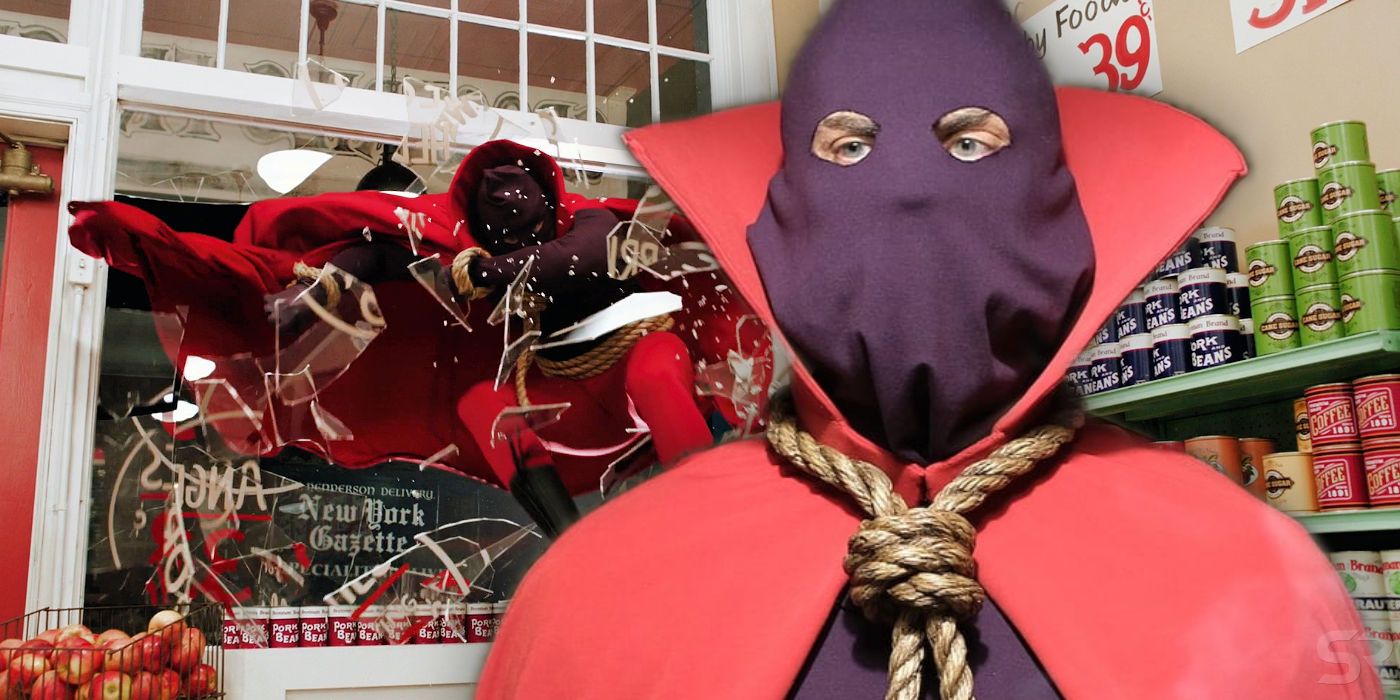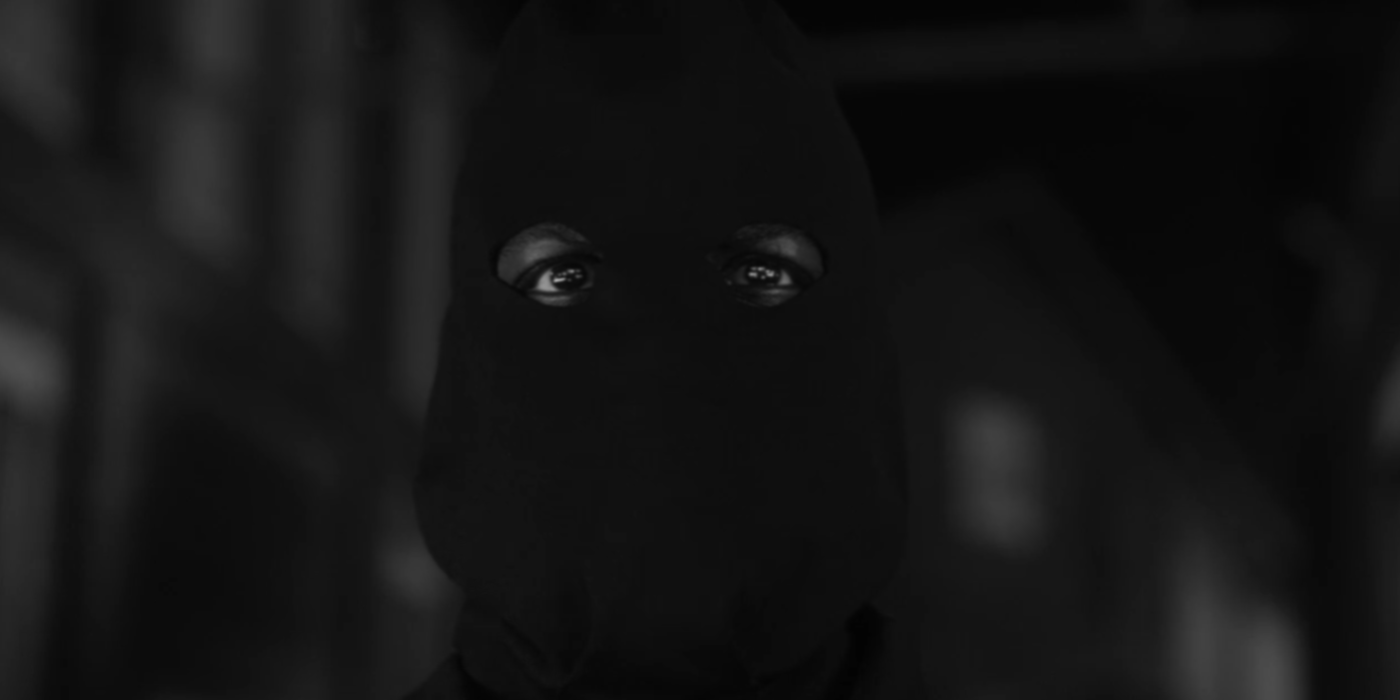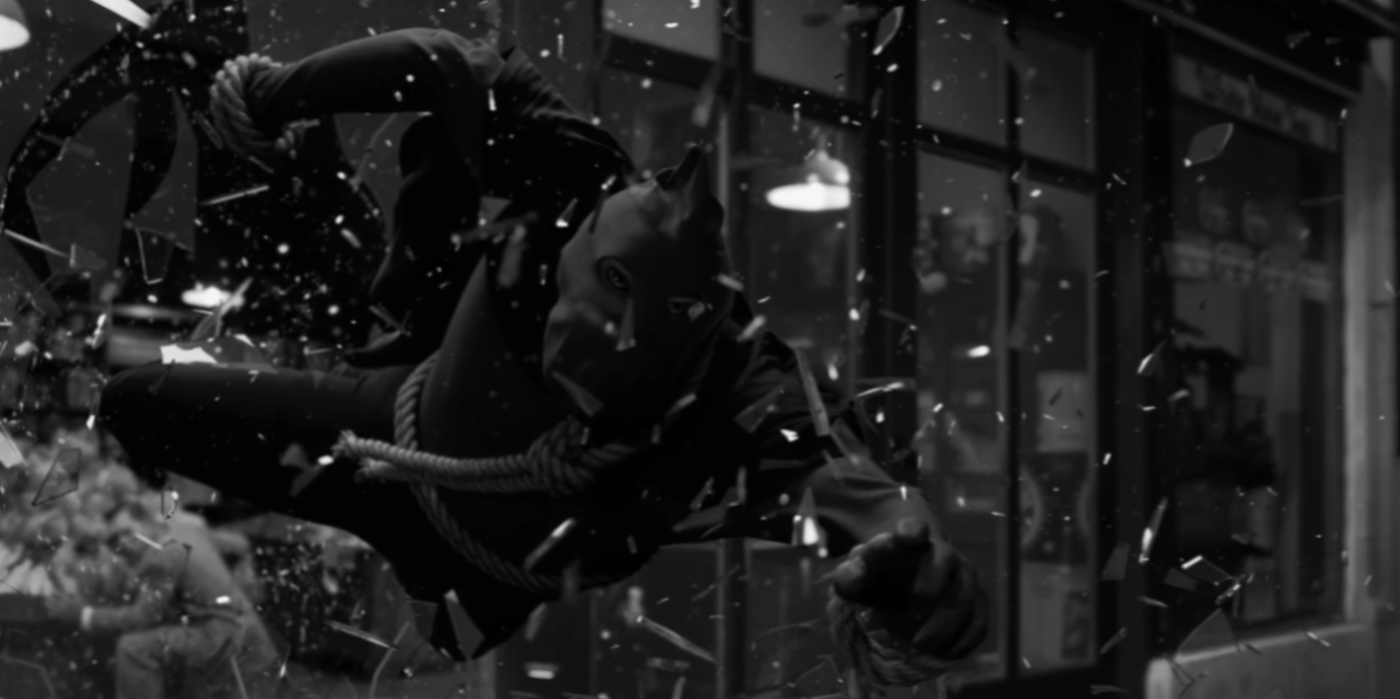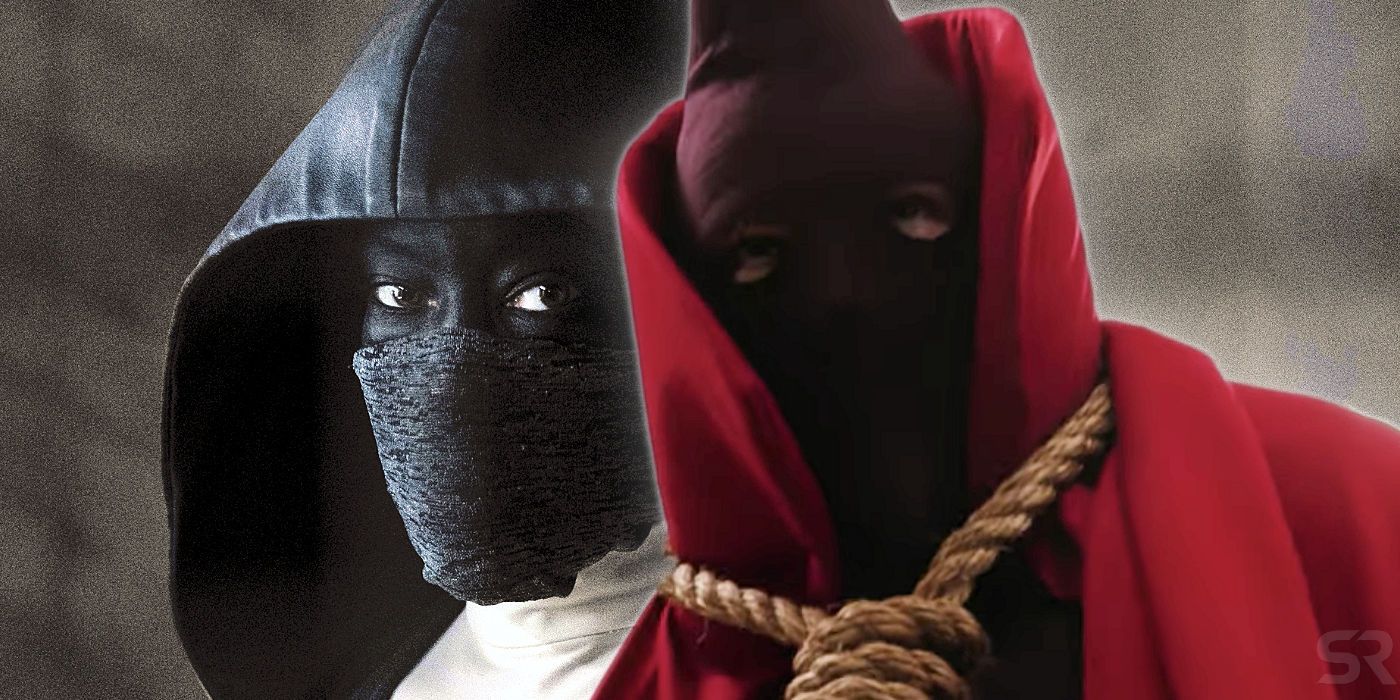HBO's Watchmen revealed the shocking true identity and origin of Hooded Justice in a way that breaks from the graphic novel yet still adheres to what's actually known about the masked vigilante, while also perfectly fitting the TV story by creator Damon Lindelof. Hooded Justice's presence was felt throughout Watchmen and was continually referenced thanks to the show-within-a-show, American Hero Story: Minutemen. But Watchmen episode 6, "This Extraordinary Being", pulls off the noosed crimefighter's hood once and for all: Hooded Justice is Will Reeves (Louis Gossett, Jr.), the grandfather of Detective Angela Abar (Regina King), and his disturbing life story set the stage for everything in Watchmen that followed.
Alan Moore and Dave Gibbons' Watchmen comics introduced Hooded Justice as the first costumed vigilante who debuted in 1938 by saving a couple from a mugging in Queens, New York. Known for his extreme violence against criminals, Hooded Justice inspired others, like Hollis Mason AKA the first Nite Owl, to don masks and fight crime. Soon, there were enough costumed heroes to form a team called The New Minutemen of America (shortened to The Minutemen) and they were a brief fad in the 1940s. While some heroes like Sally Jupiter AKA the first Silk Spectre led public lives, Moore and Gibbons were careful not to reveal the true identity of Hooded Justice; it was suggested but never confirmed that Hooded Justice was a circus strongman named Rolf Muller. Despite his posing as Silk Spectre's boyfriend, it was also heavily implied that he was in a gay relationship with another Minuteman, Nelson Gardner AKA Captain Metropolis. When all of the superheroes were forced to unmask to the House of UnAmerican Activities in 1955, Hooded Justice refused and disappeared.
For his HBO series, Damon Lindelof made the bold choice to retcon Hooded Justice to suit his story about racial injustice. In Watchmen, American Hero Story: Minutemen turned Hooded Justice's life and career into sordid tabloid fodder but it adheres to the "accepted" version that Hooded Justice was a disturbed white man obsessed with justice, a precursor to Rorschach. The truths told in "This Extraordinary Being" blow that out of the water and reveals that Hooded Justice was secretly a black man (posing as a white man) who retaliated after a lifetime of injustice that started with young Will Reeves surviving the Tulsa massacre of 1921. Watchmen recontextualized everything fans knew about Hooded Justice from the Watchmen comic - in ways some fans will likely find controversial - yet it still feels true to the story and themes of HBO's "remix" of Watchmen and its world.
Will Reeves Is Hooded Justice
It was already theorized that Will Reeves was somehow Hooded Justice - and that is indeed the case. In 1938, 17 years after surviving the Tulsa Massacre, Reeves (Jovan Adepo) had moved to New York City with his wife June (Danielle Deadwyler), who was the baby young Will rescued, and Will became only the second black police officer in the NYPD. But Officer Reeves' authority was continually undermined by both criminals and his fellow police officers and he was warned to "beware the Cyclops", which turned out to be the Klu Klux Klan operating in NYC and counted several members of the NYPD in its numbers. Reeves was lynched by those corrupt cops but he survived; it was while walking back home and finding a couple being mugged in an alley that Will snapped - Reeves donned the hood (with the noose still around his neck) and saved the couple. Hooded Justice was born, just as his first appearance was described in the comics, and, at last, Lindelof provided an explanation for HJ's unusual costume.
Angry about the injustice he found all around him, Reeves became Hooded Justice with June's encouragement - but he painted the top of his face so that anyone who saw his eyes would assume he was a white man under the hood. HJ tracked "the Cyclops" to a supermarket in Queens and discovered a nationwide plot by the Klansmen involving mesmerism. The supermarket brawl between Hooded Justice and the Cyclops was also described in the Watchmen comics (although the KKK's involvement is an amendment by Lindelof). Soon, Nelson Gardner AKA Captain Metropolis (Jake McDorman) recruited Hooded Justice into the Minutemen - and Will Reeves into his bed - but the superhero team refused to help Hooded Justice's crusade against the Klan. Finally, Reeves took justice (and vengeance) into his own hands and murdered all of the corrupt cops who were part of the Cyclops; in the process, Hooded Justice learned the KKK was using a mind control projector to incite black people to kill each other.
After Will gets violent with his young son Marcus, June and the boy leave him and return to Tulsa. Finally, in Watchmen's 2019 present day, it's revealed that Will Reeves did murder Chief Judd Crawford (Don Johnson) by using the mind control projector to compel Judd to hang himself - because Reeves somehow found out about the KKK robe (that belonged to Judd's grandfather) that Crawford kept in a secret compartment. Even at 105-years-old, Will Reeves still continues his war with the Ku Klux Klan (and the Seventh Kavalry as well).
How Watchmen's Hooded Justice Reveal Changes The Comic
It's obviously a gigantic and dicey move by Watchmen to retcon Hooded Justice into a black man seeking retribution for racist crimes but it definitely suits the HBO series' overarching themes and message about race in Robert Redford's alternate reality America. Lindelof's explanation for Hooded Justice's costume, with the Klan-like hood and the noose around his neck, makes sense in this context. (Although it's not clear if this was ever Alan Moore and Dave Gibbons' intention, the Watchmen artist and co-creator supports the HBO adaptation.) Hooded Justice's new origin is certainly racially-charged and it twists the iconography of the Ku Klux Klan into something that hunts and kills them after Will Reeves was victimized by the KKK, first as a child and then when he's lynched even though he's a police officer for the "crime" of being black. The fact that Will painted the area around his eyes white is a visual link to how his granddaughter Angela - who experienced Will's memories thanks to overdosing on Nostalgia pills - paints her eyes black when she dons her costume as Sister Night.
Intriguingly, Lindelof found a lot of leeway to revise Hooded Justice as a black man based on what the graphic novel actually revealed about him. Rolf Muller was never confirmed to be Hooded Justice and even DC Comics' Before Watchmen series (which the HBO series doesn't acknowledge) explained that Muller was a Nazi rapist and murderer but he wasn't Hooded Justice. Lindelof was able to hit some of the known beats about what HJ did and who he was, including his sexual relationship with Nelson Gardner (which is handled matter-of-factly). However, it's notable that "This Extraordinary Being" didn't introduce the TV series' version of Sally Jupiter or the Comedian; fans are meant to infer that incidents like HJ posing as Silk Spectre's boyfriend and the Comedian's sexual assault of Jupiter still happened and the latter was confirmed by Agent Dale Petey (Dustin Ingram) to Sister Night. HBO's explanation in Watchmen for why Hooded Justice never revealed who he was, even to the rest of the Minutemen, now makes sense because Will Reeves was hiding the fact that he was really a black man from the "less tolerant" superheroes on the team.
What Watchmen's Hooded Justice Twist Really Means
Hooded Justice was already a controversial figure in Watchmen's world even before Lindelof's retcon and now, whether or not Will Reeves is a hero or a villain is left to the eye of the beholder. The revision that Watchmen's first superhero was a secretly black man posing as a white avenger is certainly a powderkeg. While the argument could be made that Reeves' actions are justifiable after the crimes the Ku Klux Klan inflicted on him, Hooded Justice's actions go far beyond the "angry" man June described him to be - HJ is now unapologetically a cold-blooded murderer. (In the comics, Hooded Justice was known for his savage violence but not necessarily as a killer.) In Watchmen's retelling, Will Reeves has likely murdered countless (white) people in his long life (with and without the hood) and this revision of the character will understandably leave many fans uncomfortable. It also leaves Angela in the unenviable position of having to choose between condoning or condemning the actions of her grandfather after experiencing his life through his eyes.
Watchmen now posits that American Hero Story (and fans in real life) have completely gotten Hooded Justice wrong for decades. Meanwhile, the fact that Will Reeves discovered Superman in Action Comics #1 soon before he became Hooded Justice is also intriguing. Reeves saw parallels between his own childhood and that of baby Kal-El, who was saved by his father and sent away from the catastrophe that killed his people. But we don't know who raised Will or if anyone taught him the All-American values that the Kents imbued on Clark Kent. When Will dons the hood, he becomes a twisted version of the earliest incarnation of the Man of Steel, who was a social justice crusader known for inflicting two-fisted retribution on wife beaters, crooked landlords, and local crime bosses. But Will Reeves' actions as HJ is a blatant rejection of the nobility of superheroes that Superman evolved to represent; instead, HBO's Watchmen eschews nostalgia and has reinterpreted Hooded Justice as the direct product of America's racist past and a punisher of those crimes.
Watchmen airs Sundays @ 9pm on HBO.




